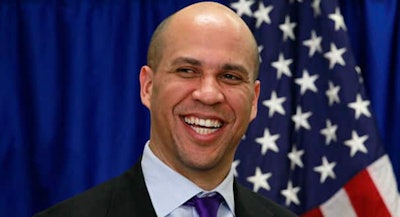Senators Cory Booker (D-N.J.) and Doug Jones (D-AL) on Thursday pressed for $1.5 billion in emergency funding to help historically Black colleges and universities (HBCUs) and other minority-serving institutions (MSIs) respond to the coronavirus pandemic.
The senators join leaders of HBCUs, the United Negro College Fund (UNCF) and the Thurgood Marshall College Fund (TMCF), who earlier this week also lobbied Congress for a one-time allocation of $1.5 billion to help HBCUs and MSIs during the coronavirus crisis. Leaders of the country’s 105 HBCUs and the UNCF and the TMCF said that the costs of operating during the pandemic threaten their future survival.
In the past weeks, several of these under-resourced institutions have covered expenses for students from low-income families who have had to leave campus and go back home. They have also had to make a shift to online learning so students’ academics don’t suffer during the stoppage of in-person classes in an effort to avoid the spread of the coronavirus. This has meant additional investment in expensive technological infrastructure as well as Wi-Fi hotspots for students without access to the internet at home. As it is, many HBCUs and MSIs struggle financially because they have smaller or no endowments, lower levels of federal funding and relatively fewer alumni donations.
Booker and Jones wrote a letter to Senate Majority Leader Mitch McConnell (R-KY), Senate Minority Leader Chuck Schumer (D-N.Y.) and Senate appropriators to include the $1.5 billion in emergency funding for HBCUs and MSIs in the Senate’s third supplemental appropriations package — under Title III, Part A and B, Title V and Title VII of the Higher Education Act — in response to COVID-19, the respiratory illness caused by the coronavirus.
 Senator Cory Booker
Senator Cory Booker“Title III and V and VII institutions are a refuge for the communities of students that they serve, and in these uncertain times they are needed now more than ever,” the senators said in their letter. “Assuring an increase in funding for Title III and V will allow these schools to continue operating without fear of going bankrupt or having to raise tuition next year.”
The reason this funding is “needed now more than ever,” the senators said, is because many of these institutions don’t have online learning and distance education embedded in their curriculum.
“For example, Morehouse College in Atlanta, Georgia does not yet have access to mobile learning technology and is now buying 1,000 Wi-Fi hotspots for students to use,” said Booker and Jones. “Additionally, students moving off of campus are potentially asking for refunds for both room and board from these institutions with the potential to cause a $2-$4 million-dollar debt. Lastly, many of these institutions are picking up the extra cost of housing those students that are experiencing the harshest hardships.”
The UNCF, the TMCF and the National Association for Equal Opportunity in Higher Education (NAFEO) underscored Booker’s and Jones’ concerns and supported their call for immediate emergency funds for HBCUs and MSIs, in a press statement.
“These 800 equal educational opportunity American colleges and universities are graduating 4.8 million undergraduate students in the U.S., 24% of all students. They are doing this despite their woeful underfunding,” said NAFEO President and CEO Lezli Baskerville. “They are ‘punching way above their weight.’ We urge all United States Senators to Senator Booker’s request for $1.5B for HBCUs, TCUs and MSIs in the third Coronavirus supplemental.”
“At a time when Congress is attempting to shore up our economy against the Coronavirus, it should be cognizant of the fact that our schools help educate some of our nation’s most vulnerable communities and, as such, they are particularly worthy of our federal government’s support in this season of heightened need,” said Dr. Harry Williams, TMCF’s president.
Dr. Michael Lomax, UNCF’s chief executive, also stressed the nature of the community HBCUs and MSIs serve.
“Our institutions are dealing with unique circumstances because of who we serve. The digital divide is real in our community, and a stimulus bill should definitely reflect our needs and proposed solutions. We applaud Senators who are stepping up to the plate to advocate for our institutions and the students they serve,” said Lomax.
Earlier this week, UNCF, TMCF and some HBCU presidents took part in a conference call convened by Rep. Alma Adams (D-N.C.), founder and co-chair of the Bipartisan HBCU Caucus, to discuss the precarious state HBCUs and MSIs will be in even as they fulfill their responsibilities to their students, reported the Washington Informer.
“HBCUs graduate an outsized proportion of African-American college graduates and an outsized proportion of low-income, first-generation college students,” Adams said in written responses to questions. “In order to ensure HBCUs continue their mission, they need assistance in emergencies such as this.”















